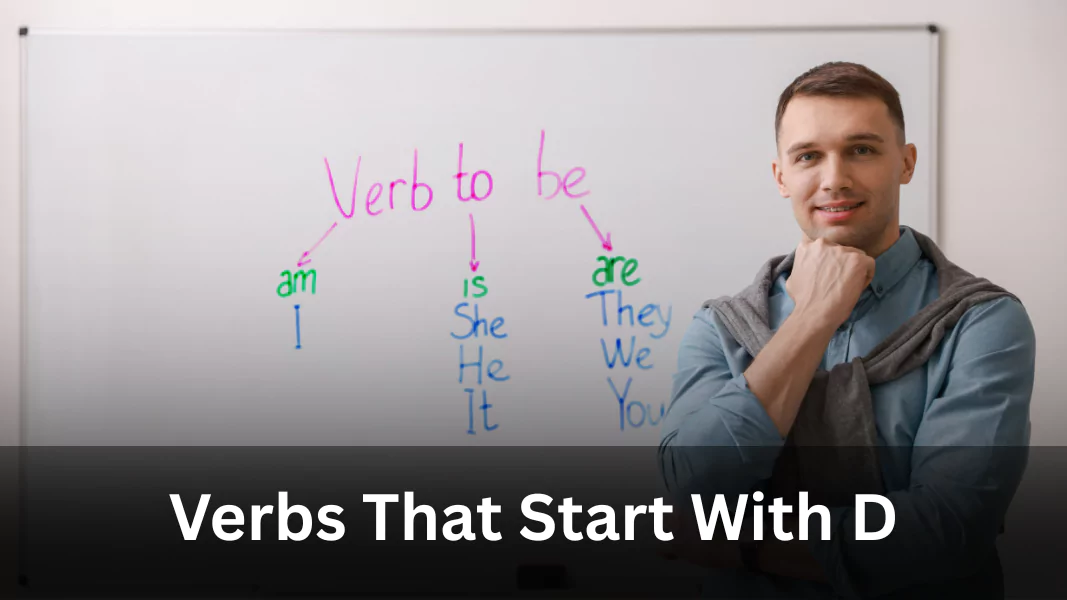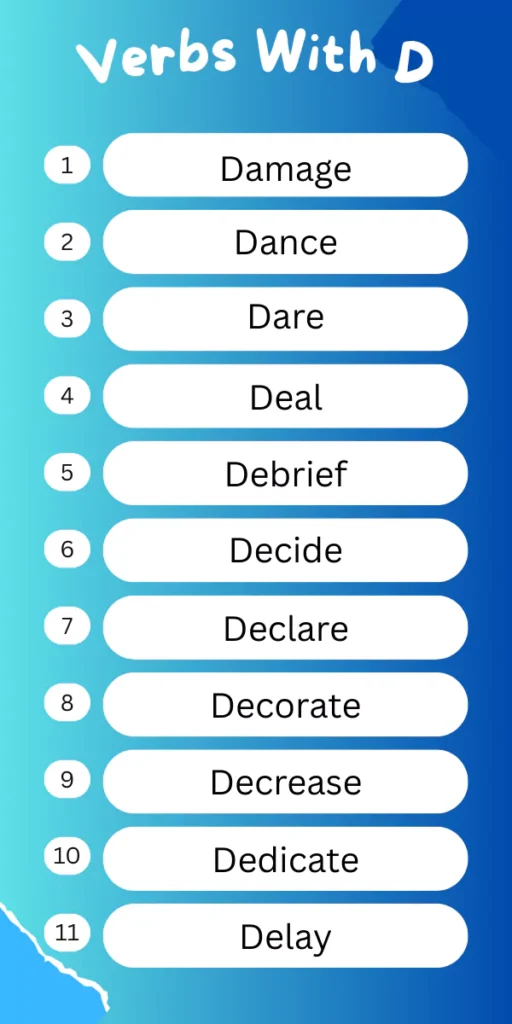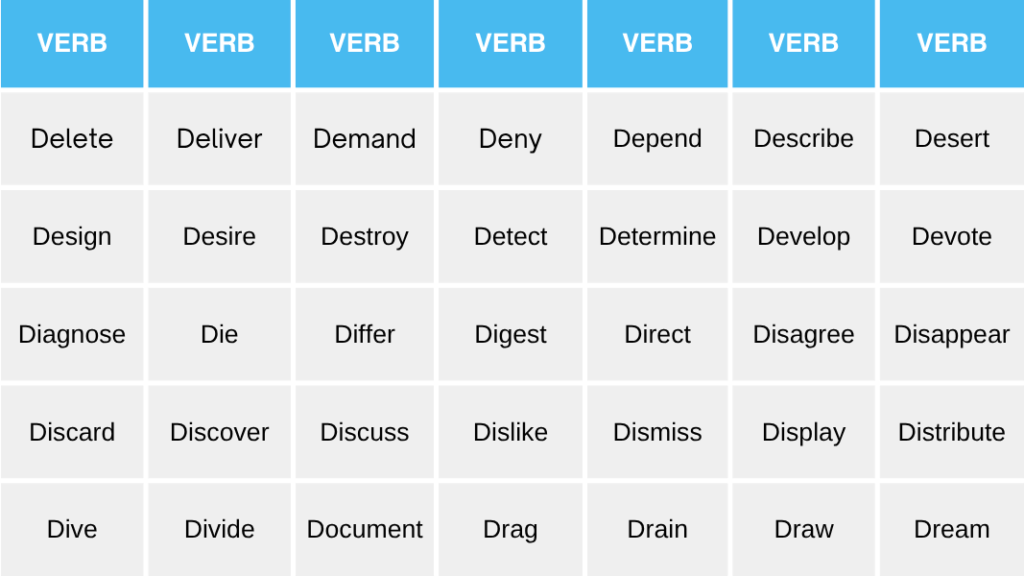Verbs That Start With D – Complete Word List & Meanings

Verbs that start with the letter D bring energy, variety, and clarity to our language. From simple everyday actions like do, drive, and dance to more powerful and impactful words such as develop, direct, and discover, these verbs help us express ideas with precision and creativity. Whether you’re expanding your vocabulary for writing, speaking, or even a fun game of Scrabble, exploring D-verbs can add depth and dynamism to your communication.
List of Verbs That Start With D
Verbs beginning with the letter D cover a wide range of actions, from everyday movements to abstract ideas. Common examples include dance, decide, deliver, define, describe, develop, direct, and discover. These words not only enrich everyday conversations but also add variety and precision to writing. Whether you’re looking for simple action verbs like do and drive or more advanced terms such as deduce and dominate, D-verbs provide powerful options to express thoughts clearly and effectively.

Common Verbs Starting With D
- Dance – to move rhythmically to music.
Example: She loves to dance at weddings. - Decide – to make a choice between options.
Example: He couldn’t decide which movie to watch. - Deliver – to bring or hand over something.
Example: The courier will deliver the package today. - Describe – to explain something in detail.
Example: Can you describe the suspect to the police? - Depend – to rely on someone or something.
Example: Children depend on their parents for guidance. - Do – to perform an action.
Example: I will do my homework after dinner. - Drive – to operate a vehicle.
Example: She learned to drive at the age of 18. - Drop – to let something fall.
Example: Don’t drop the glass; it might break. - Draw – to produce a picture with lines.
Example: The child loves to draw animals. - Drink – to consume liquid.
Example: We usually drink water after exercise. - Develop – to grow or improve.
Example: He wants to develop new skills at work. - Direct – to guide or lead.
Example: The teacher will direct the students to their classrooms. - Demand – to ask forcefully for something.
Example: The workers demand fair wages. - Discuss – to talk about something with others.
Example: We will discuss the project tomorrow. - Dress – to put clothes on oneself or another.
Example: She takes time to dress for special occasions.
Positive Verbs Starting With D
| Verb | Meaning | Example |
|---|---|---|
| Dedicate | to commit to a task or purpose | She dedicated her life to helping others. |
| Delight | to give great pleasure or joy | The surprise party will delight her. |
| Donate | to give something for a good cause | They donate clothes to the local shelter. |
| Discover | to find something new | Scientists discover new medicines every year. |
| Design | to plan and create something | She will design a beautiful dress. |
| Devote | to give time or energy to something | He devotes his weekends to community service. |
| Defend | to protect against harm | The lawyer will defend her client in court. |
| Display | to show something clearly | The shop will display new products in the window. |
| Demonstrate | to show how something works | The chef will demonstrate how to bake bread. |
| Determine | to firmly decide on something | She was determined to finish her degree. |
| Distinguish | to recognize differences | It’s hard to distinguish between the twins. |
| Diversify | to add variety | The company plans to diversify its products. |
| Decorate | to make something more attractive | They decorate the house for Christmas. |
| Dazzle | to impress greatly | The singer’s performance will dazzle the audience. |
| Dominate | to have control or influence | Their team continues to dominate the league. |
Action Verbs Starting With D
- Dash – to run quickly.
Example: He dashed across the street to catch the bus. - Dig – to break up or move earth.
Example: They dig holes to plant trees. - Dive – to jump into water headfirst.
Example: She dove into the swimming pool. - Drag – to pull something along the ground.
Example: He dragged the heavy suitcase behind him. - Dodge – to move quickly to avoid something.
Example: She dodged the ball during the game. - Dispatch – to send off quickly.
Example: The office will dispatch the documents today. - Detach – to separate something from a whole.
Example: Please detach the coupon before checkout. - Drill – to make a hole using a tool.
Example: He drilled a hole in the wall. - Disarm – to take weapons away.
Example: The police disarmed the criminal. - Detour – to take a longer or different route.
Example: We detoured through the countryside to avoid traffic. - Disperse – to scatter or spread.
Example: The police asked the crowd to disperse. - Drift – to move slowly without direction.
Example: The boat drifted across the lake. - Deploy – to move resources into position.
Example: The army deployed troops to the border. - Discard – to throw away something useless.
Example: She discarded the old newspapers. - Disrupt – to interrupt or cause disturbance.
Example: The loud noise disrupted the class.
Rare and Unique Verbs Starting With D
| Verb | Meaning | Example |
|---|---|---|
| Dapple | to mark with spots or patches | Sunlight dappled the forest floor. |
| Decant | to pour liquid gently into another container | She decanted the wine into a glass. |
| Decry | to criticize openly | The council decried the act of vandalism. |
| Deign | to do something reluctantly or below one’s status | He didn’t deign to answer the question. |
| Deride | to mock or ridicule | The critics derided his new book. |
| Disentangle | to free from a knot or mess | She disentangled her hair from the brush. |
| Dismantle | to take apart | They dismantled the old machine. |
| Disseminate | to spread widely | The organization disseminates health information. |
| Dwindle | to gradually become smaller | The town’s population dwindled over time. |
| Divulge | to reveal secret information | He refused to divulge the password. |
| Dislodge | to remove from a position | The storm dislodged the roof tiles. |
| Defenestrate | to throw out of a window | The rebels threatened to defenestrate the ruler. |
| Debunk | to expose as false | The scientist debunked the myth. |
| Delineate | to describe or portray precisely | The map clearly delineates the border. |
| Denounce | to publicly declare something wrong | The leader denounced corruption in the government. |
Regular Verbs That Start With D
- Dance – to move rhythmically to music.
Example: They danced all night at the party. - Deliver – to bring or hand over.
Example: The courier delivered the parcel on time. - Discover – to find out something new.
Example: She discovered a shortcut to the park. - Decorate – to make something attractive.
Example: They decorated the hall with balloons. - Demand – to ask forcefully.
Example: Workers demanded better pay. - Describe – to explain in words.
Example: He described the scenery in detail. - Develop – to improve or grow.
Example: The company developed new software. - Display – to show clearly.
Example: The museum displayed ancient coins. - Divide – to separate into parts.
Example: The teacher divided the class into groups. - Depend – to rely on.
Example: Success depends on hard work. - Design – to plan and create.
Example: She designed her own website. - Discuss – to talk about.
Example: They discussed their holiday plans. - Decorate – to beautify.
Example: The kids decorated the Christmas tree. - Decide – to choose between options.
Example: He decided to take the job offer. - Donate – to give freely.
Example: She donated money to charity.
Irregular Verbs Starting With D
| Verb | Meaning | Example |
|---|---|---|
| Do | perform an action | She did her homework on time. |
| Draw | to produce a picture | He drew a sketch of the mountain. |
| Drive | to operate a vehicle | She drove to work this morning. |
| Drink | to consume liquid | They drank lemonade at the picnic. |
| Dig | to break up earth | Farmers dug trenches for irrigation. |
| Dwell | to live or stay in a place | He dwelt in the countryside. |
| Deal | to handle or distribute | The shopkeeper dealt fairly with customers. |
| Dive | to jump into water | She dove into the pool gracefully. |
| Dream | to experience thoughts while asleep | He dreamt about flying. |
| Dare | to have courage to do something | She dared to speak the truth. |
| Dress | to clothe oneself | He dressed quickly for the meeting. |
| Depart | to leave a place | The train departed at 8 a.m. |
| Deal | to manage or cope | He dealt with the situation calmly. |
| Drown | to die by suffocation in water | The child nearly drowned in the river. |
| Drive | operate a vehicle | He drove across the country last summer. |
Phrasal Verbs Starting With D
- Deal with – to handle a problem.
Example: She had to deal with many challenges. - Drop off – to deliver or leave something/someone.
Example: He dropped off the kids at school. - Dress up – to wear fancy clothes.
Example: They dressed up for the wedding. - Die down – to become weaker or quieter.
Example: The storm died down by evening. - Do without – to manage without something.
Example: We had to do without electricity last night. - Draw up – to prepare a document.
Example: The lawyer drew up the contract. - Drop by – to visit casually.
Example: She dropped by her friend’s house. - Do over – to redo something.
Example: He did the assignment over to improve it. - Drag on – to last too long.
Example: The meeting dragged on for hours. - Drop out – to quit or leave.
Example: He dropped out of college. - Do away with – to abolish or remove.
Example: The law was done away with years ago. - Draw out – to prolong something.
Example: He drew out the speech unnecessarily. - Drift apart – to gradually separate.
Example: The two friends drifted apart over time. - Dash off – to leave quickly.
Example: He dashed off to catch the train. - Double down – to increase effort or commitment.
Example: They doubled down on their marketing strategy.
Popular & Impactful Verbs That Start With D
| Verb | Meaning | Example |
|---|---|---|
| Dominate | to control strongly | Their team dominated the game. |
| Discover | to find something new | Scientists discovered a new planet. |
| Deliver | to provide or hand over | The speaker delivered an inspiring message. |
| Determine | to decide firmly | She is determined to succeed at all costs. |
| Demonstrate | to show clearly | The teacher demonstrated the experiment. |
| Defend | to protect against attack | The army defended the borders. |
| Develop | to grow or advance | The city developed rapidly over the years. |
| Drive | to push or motivate | Ambition drives him to work hard. |
| Define | to explain meaning | The dictionary defines words precisely. |
| Design | to plan or create | She designed an elegant building. |
| Delegate | to assign tasks to others | The manager delegated responsibilities to the team. |
| Debate | to argue formally | The students debated environmental issues. |
| Distinguish | to recognize differences | She distinguished herself as a talented leader. |
| Disrupt | to interrupt normal activity | Technology disrupted traditional markets. |
| Diversify | to add variety or expand | The company diversified into new industries. |

Fun Facts About Words Beginning With D
- The Word “Do” is One of the Oldest Verbs in English – The verb do has roots in Old English (don) and is still one of the most frequently used verbs today, making it both ancient and timeless.
- “D” Words Often Symbolize Action and Drive – Many powerful action verbs start with D—like dash, dive, develop, and dominate—giving the letter a strong association with energy and movement.
- Double D Words Sound Catchy – Words like ding-dong, doodle, dandy, and dilly-dally show how repeating the letter D often creates playful, memorable expressions in English.
- Some D Verbs Come from Latin Roots – Words such as define (from Latin definire, “to set limits”) and describe (from Latin describere, “to write down”) reveal how much influence Latin has had on English D-verbs.
- “D” is a Versatile Letter Across Languages – In many languages, D-verbs have similar meanings—like decidir in Spanish (decide) and défendre in French (defend)—showing that D-verbs often carry universal ideas of decision-making, direction, and defense.
Read: Verbs That Start With A
Read: Verbs That Start With B
Read: Verbs That Start With C
FAQs
Conclusion
Verbs that start with the letter D bring depth, direction, and dynamism to the English language. From everyday essentials like do, drink, and drive to more advanced words such as diversify, demonstrate, and dominate, D-verbs enrich communication by adding variety and precision. Whether you’re building your vocabulary, improving your writing, or preparing for word games, mastering these verbs will make your language more engaging, impactful, and expressive.
